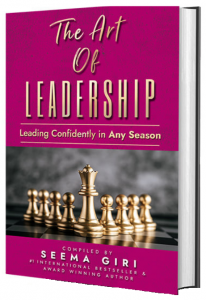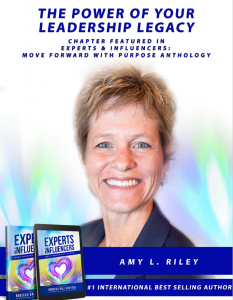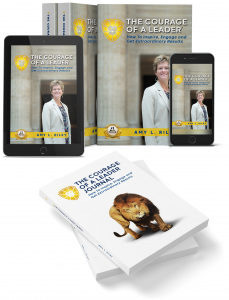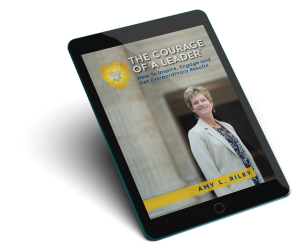Karin Hurt of Let’s Grow Leaders inspires courage, confidence and innovation. In this episode, she shares her extensive research and proven tactics for having team members speak up and share their best ideas and thinking. This is what creates powerful, innovative, and productive cultures.
About the Guest:
Karin Hurt helps human-centered leaders find clarity in uncertainty, drive innovation, and achieve breakthrough results. She’s the founder and CEO of Let’s Grow Leaders, an international leadership development and training firm known for practical tools and leadership development programs that stick.
She’s the award-winning author of four books including Courageous Cultures: How to Build Teams of Micro-Innovators, Problem Solvers, and Customer Advocates and Winning Well: A Manager’s Guide to Getting Results-Without Losing Your Soul and a hosts the popular Asking for a Friend Vlog on LinkedIn. A former Verizon Wireless executive, Karin was named to Inc. Magazine’s list of great leadership speakers.
Karin and her husband and business partner, David Dye, are committed to their philanthropic initiative, Winning Wells – building clean water wells for the people of Cambodia.
The best way to reach Karin is by email, karin.hurt@LetsGrowLeaders.com
About the Host:
Amy L. Riley is an internationally renowned speaker, author and consultant. She has over 2 decades of experience developing leaders at all levels. Her clients include Cisco Systems, Deloitte and Barclays.
As a trusted leadership coach and consultant, Amy has worked with hundreds of leaders one-on-one, and thousands more as part of a group, to fully step into their leadership, create amazing teams and achieve extraordinary results.
Amy’s most popular keynote speeches are:
The Courage of a Leader: The Power of a Leadership Legacy
The Courage of a Leader: Create a Competitive Advantage with Sustainable, Results-Producing Cross-System Collaboration
The Courage of a Leader: Accelerate Trust with Your Team, Customers and Community
The Courage of a Leader: How to Build a Happy and Successful Hybrid Team
Her new book is a #1 international best-seller and is entitled, The Courage of a Leader: How to Inspire, Engage and Get Extraordinary Results.
https://www.linkedin.com/in/amyshoopriley/
Link mentioned in the podcast
How to Use What We Know About Neuroscience to Be Exponentially More Influential (podcast episode): https://courageofaleader.com/captivate-podcast/how-to-use-what-we-know-about-neuroscience-to-be-exponentially-more-influential-with-laura-berger/
The Courage to Be An Inclusive Leader (podcast episode): https://courageofaleader.com/captivate-podcast/the-courage-to-be-an-inclusive-leader-with-ellen-burton/
Innovative Ways You Can Create a More Sustainable World (podcast episode): https://courageofaleader.com/captivate-podcast/innovative-ways-you-can-create-a-more-sustainable-world-with-simon-bailey/
The Inspire Your Team assessment (the courage assessment): https://courageofaleader.com/inspireyourteam/
Let’s Grow Leaders blog:
https://letsgrowleaders.com/award-winning-leadership-blog/
Karin’s books:
https://letsgrowleaders.com/great-leadership-books/
Karin’s Asking for a Friend show:
https://letsgrowleaders.com/asking-for-a-friend/
Thanks for listening!
Thanks so much for listening to The Courage of a Leader podcast! If you got inspired and/or got valuable leadership techniques you can use from this episode and think that others could benefit from listening, please share using the social media buttons on this page.
Do you have questions or feedback about this episode? Leave a comment in the section below!
Subscribe to the podcast
If you would like to get automatic updates of new The Courage of a Leader podcast episodes, you can subscribe to the podcast on Apple Podcasts. You can also subscribe in your favorite podcast app.
Leave us an Apple Podcasts review
Ratings and reviews from our listeners are extremely valuable to us and greatly appreciated. They help our podcast rank higher on Apple Podcasts, which helps us ignite The Courage of a Leader in more leaders! Please take a minute and leave an honest review on Apple Podcasts.
Teaser for next episode
Tune in next for The Power of Values-Based Collaboration: How to Work Together Better Than Ever with Phil Gafka.
Transcript
My guest today Karin Hurt of Let's Grow Leaders inspires courage, confidence and innovation. Karin shares her extensive research and proven tactics for having team members speak up and share their best ideas and thinking. This is what we need to create powerful, innovative and productive cultures. I'm glad you're here to learn from Karin.
Amy Riley:Welcome to the Courage of a Leader podcast. This is where you hear real life stories of top leaders achieving extraordinary results. And you get practical advice and techniques, you can immediately apply for your own success. This is where you will get inspired. And take bold, courageous action. I am so glad you can join us. I'm your host, Amy Riley. Now, are you ready to step into the full power of your leadership and achieve the results you care about most? Let's ignite the courage of a leader.
Amy Riley:Karin, thank you for being with me today.
Karin Hurt:Oh, thank you so much for having me. It's absolutely my pleasure.
Amy Riley:Yeah, I'm excited about the conversation that we are going to have today, we are going to talk about how leaders can encourage people to step up and to speak out, because that's what we need to have innovative results producing cultures. Now, I want to start with a question, Karin, why don't people speak up? Because I think we're learning that it's not enough to just get a group of smart people together even a group of smart, diverse folks that have different perspectives and different experiences. Right? Even when we bring people together, we now know that not everybody is finding it safe, and okay to speak up and to speak their mind. And I know you have research on this. Let's start there. Why don't people speak up?
Karin Hurt:You know, it's it's interesting, what the reason we got so curious about this topic is that we were working with very senior leaders all over the world. And we would hear this concern, why don't people speak up? Why don't they share their ideas? Why are people sharing best practices? And in frustration of your Why am I the one that has to like do a skip level meeting or a focus group to ask people for these things? Why aren't my middle managers and frontline managers doing that? Well, what was fascinating is we would go into the frontline to training these very same organizations, and we would hear this frustration, nobody wants my ideas. The last time I spoke up, I got in trouble. My manager operates around the notion of this is the way we've always done it. So we did some really extensive quantitative and qualitative research to ask a couple of questions when people were not speaking up or holding back ideas, what kinds of ideas were they holding back, and they weren't trivial, wasn't like, Oh, I wish I had come Bucha in the break room or virtual Taco Tuesdays that they were holding back really important ideas to improve the customer experience, the employee experience or productivity in a process. So then we said, Well, why are you holding back these ideas? And a couple of highlights, the most fascinating was that 56% said, the reason I am not sharing an idea is because I won't get credit, I'm not going to be recognized for 49% said they're not regularly asked for their ideas. And 50% said, nothing's ever going to happen anyway. So why bother? And then 40%. So they lack the competence to share their ideas. So it takes more, as you were just saying, Amy, it takes more than an open door or going out and saying, Yeah, bring me any ideas. Because for most people, they don't have the confidence. They don't have competence, and something's gonna happen. They don't think their manager wants their ideas. And all of those are headwinds. And what we found that it's been really interesting to as we've gone into apply these tools and the techniques that we built after the research, we are finding that it really comes down to a couple of things like first, you've got to eliminate any toxic courage Crusher, right shame, blame intimidation, and you know, be interesting. Sometimes people will say, Oh, yeah, come in, we really want people to share their ideas, but then you stumble across really bad bullying or something terrible, and you're always gonna have energy for that. Right if you still have that going on. So that's the first thing to do. And then the next one This important thing is really creating clarity. And that's clarity around to things, not just clarity that you want people's ideas, most, most people are pretty good about that. But it's clarity around what a good idea would accomplish. So as we tested the tools, we try them in a couple of ways. And in some circumstances, we would say, bring us any ideas that you think would improve our team, any ideas that would improve productivity, any ideas that you want improve the customer experience? And people the ideas were there, all right, but they weren't getting implemented. But then we encourage leaders say, hey, you know, what, we need an idea on right now how to make this one process better, or how to improve our, you know, employees work at home experience, or being very specific, then what we got was really implementable practical ideas,
Amy Riley:specifically channel their thinking, yes. Oh, did you say those three things?
Karin Hurt:So it started with navigating narrative, creating clarity, yeah. And then it's cultivating curiosity. And this is proactively going out and asking people for their ideas, right. So we know what's one way we can improve the customer experience. So we have seven steps, but four, I like to teach to any leader at any level. And the final one is responding with regard. Because that nothing ever happens. Anyway, statistic is all about people, not the feedback loop not being closed, I bring you an idea. You say great, nothing ever happens. I think nothing ever happens. Sometimes you may have actually done something with that idea. And so we say, you know, even if there's an idea that is completely wacky, you can't use it, still respond with gratitude, thanking them for the idea, information about what's going to happen next, whether you're gonna use it or not use it, why what's the situation, and then an invitation to continue to contribute?
Amy Riley:Terrific. Karin has a lot of great information already. I am still struck by those percentages in your research, right? 56% not speaking up because they won't give get credit. 40% Lacking the the confidence, right. So it's just has me thinking of like, yeah, all the ways that leaders can encourage folks to, to speak up here and let me tell listeners a little bit more about who you are. Karin Hurt of Let's Grow Leaders inspires courage, confidence and innovation, a former Verizon Wireless executive, she's known for growing courageous leaders, building great cultures and inspiring high performance teams. She's the award winning author of four books, a fifth one coming next year, including courageous cultures, and was named as an inc great leadership speaker for her highly interactive keynotes and executive programs. She inspires and guides leaders with leadership development programs, a weekly blog and asking for a friend show we will get links to those in the show notes. Karin, thank you so much for being here.
Karin Hurt:Yeah, this is a lot of fun. I mean, we're kindred spirits, right, I'm looking at your background is is courage. So we're, and I've got my courage lion in the background. She's experimenting there. So
Amy Riley:Oh, I love it. Love it. Yes. So listeners can hear why we were immediately drawn to one another and wanted to continue the conversations. All right. So there's some statistics out there leaders. Now we need to do some things differently. If we want our team members to step up and give us those really great important ideas that they're holding back. So the first strategy or approach you mentioned, Karin was eliminating toxic courage, culture,
Karin Hurt:toxic courage, crushers is what we call them. So things like shame, blame and intimidation.
Amy Riley:Yeah. So so how do leaders do that?
Karin Hurt:Well, you know, the first thing you know, it really depends on what level of the organization you're in. So if you are, you know, if you are a C level person, if you are in HR, what are your policies and what is your tolerance and who are you promoting what and one of the interesting things that is very, very disturbing is so frequently, particularly in sales organizations, the really high performers, if they are knocking it out of the park, if they've got the deep, deep relationships with clients, like, well, we're just gonna look the other way and we're gonna let this bullying or not anxious behavior continue? Because we can't if we say something, but if you are allowing that even with one person, yeah, it is Everyone is watching. And if you're promoting people who are exhibiting those behaviors, we're on your executive team, you've got somebody with this ridiculous temper that just blows up and shouts F bombs when something goes wrong. And you're like, oh, but that's okay. But you know what, we really value psychological safety around here. So, you know, everybody's watching what is actually happening. So, but you might be listening, you're like, Yeah, but I am not the CEO, I am not the CHR. Oh, so then I would say, What are you doing on your team, in your circle of influence. And one of the things to really remember is, even if you are the most human centered leader, showing up telling you people that you want their ideas, it is statistically likely because of that statistically valid research that people are holding on to a negative experience from the past. And it may not even be at your organization, and it may not be with you. But they're saying, You know what, I lacked the confidence to share the ideas, I shared an idea before Nothing ever happened anyway, my old manager didn't want my ideas, what's different with you? And I know this plays out, because clearly, I was at Verizon for 20 years. And I lead to get really large teams and a 10,000 person team in my last role there. And I said, I feel like you're not sharing your ideas with me. Mm hmm. And she says, Well, ya know, and all that stuff came out. And I said, Have I ever given you any indication that and she's like, No, but you know, I'm 50 years old. And I just, I'm not going to know how
Amy Riley:this works. Yeah. Yeah. So
Karin Hurt:Right. So I would encourage, you know, go like, I go into any room. And so there's probably there's statistically like, the there are half the people in the room, are gonna need some help to and encouragement to speak up. And, you know, so how do you do that? Well, you do that by asking making it easy to ask to reduce the headwinds for people. And so for example, me if I, if you and I've been working together for a while, and then I would say, Hey, you have any ideas that would make me a better leader? Well, even if we have deep psychological safety between us, you're gonna be like, I'm likely you're like, well, any ideas? A care? And where do I start? I have so many more. Or, you know, I'm not she really ready for that one. Maybe I'll give her this one. But if I say, Amy, you know, I am really working on how to make our meetings more effective. What is one idea that you have one specific thing that I could do to make that better? Yeah, you're, it's easy now for you, because nobody's meetings are perfect. And you're gonna have ideas. And so then, thank you so much. Ah, that that is a good idea. Or oh, you know, or whatever it is, maybe it's not, but I thank you for it. And they say, Do you have anything else that you think would make me a more effective leader?
Amy Riley:Now? They're open and warmed up? Yeah. Yeah.
Karin Hurt:Yeah. Or you could ask for the next specific thing that you need. But it's it's breaking it down, and then showing that you are responding to that to the people's feedback. And we'd like to start with a small ones, you know, meetings is pretty safe. Yeah. Everybody likes to hate meetings. Everybody has an opinion about meetings. And it's not particularly personal. Right, Kevin, I think you should have an agenda. That's not that personal, right. But then you can work your way up to the deeper issues of trust, you know, collaboration,
Amy Riley:very great care. And you said, a lot of good things. I'm going to recap these. So if you're at the level or in a position where you can impact policy, take a look there, right and don't allow the bullying behavior. You said it happens in sales organizations. I've seen the brilliant engineer or the brilliant scientist, right, everybody kind of just let some of those not collaborative behaviors. Keep going. And keep asking, letting people know that you want their ideas. And I love this. Karin gets specific. Ask for specific ideas. I've had conversations with leaders recently about getting feedback. I'm not like, Oh, no one ever no one ever gives me any feedback. Right? And then when you dig a little deeper, it's because they're just asking that open ended question. Do you have any want for me? Yeah, people are not stepping in. So okay, well, what do you You want feedback on? Yeah, right? And then ask for ask for something you're doing well, and something that you're not doing well, yes, age, right. And then you're inviting them to speak to both sides of the coin. I'm really help it, encourage them. create clarity about what a good idea would accomplish. We've talked some about that. Anything you would add there, Karin?
Karin Hurt:I would say, I'll get a call on this. Can you come work with our middle management team? They're just not critical thinkers. They're just not strategic enough? Uh huh. The the number one thing when I pull back the covers on that is that people do not have enough context or information to be strategic. Yeah. Okay. So a lot of times, you know, executives will be working on strategy, they understand they have the data, they, and so then they build a communication plan. And they simplify it, which is good. Once you do that, they go out and they but and then but they don't give people a chance to catch up to ask the questions to think about how that would work for their team. They don't. And so people are okay, yeah, sure. Do you have any ideas about this? No, but because they don't understand it enough. So I think that's the other you know, another area is, how are you really not just communicating strategy? You know, I say, just talking EBIT DA Talk what I need from ya, right, so like, what is the, you know, alright, so this is our strategy. Now, this is how I think it's going to play out before we do a check for understanding, can they repeat it back to you? Do they really understand? What do you think the impact is going to be for your team on that, and you may learn a lot there, because you're now you're encouraging people to speak up? Well, I hear why we're doing that, here are my concerns, and people are going to have concerns, it is better to know what they are, then you can choose to doesn't mean you're gonna necessarily change your strategy, but you need to help it but if you want by, and you need to make it safe for people to talk about, well, what's the impact going to be on my team with this, that, so I'd say that is the you know, the in terms of really telling people where you need an idea. And then the other is when we do what we call an idea incubator process, where we have a series of tools that create the clarity, then they cultivate the curiosity and invite people to share their ideas. And so we teach a very simple way for people to position their ideas, and we use it in the workshop or, but we also that once you learn this method, you could say anytime you have an idea, bring me an idea. And this way, I Why is this idea interesting? Meaning Why is it strategically aligned with where we need a great idea? D? doable? Why is this idea something we could actually pull off? Right? Because it's a big change in regulation, and you're gonna have to call compliance and they're gonna have to go lobby and lobby Congress. And All right, well, maybe that's an idea that you can hand off. But that's not an idea that we're going to be able to implement on this team right now. Okay, engaging, who else might we need to involve? To make this idea happen? Does it need to be stakeholder with finance with HR? Do you need to get your boss's boss it? Is there another department downstream or upstream that needs to be involved? And a actions? What are a couple of specific actions or next steps? And I will tell you that if you just take that no matter what level you are, yeah, it and you teach your team, like when we were talking about ideas, can you think through these things and then bring them to our next meeting in the sweat? Right? You know, and it is May 8, so if you are even if you're an emerging leader, right? You don't have direct reports yet. You go to your manager and say, Hey, I have an idea that could include improve the customer experience. Here's why it's interesting, doable, engage act, here are the key actions. Even if they say no, you have just showed up caring about the business, a critical thinker, who is articulate communicator, you've got to win, even if it doesn't, if this one doesn't go
Amy Riley:really great. Karin, leaders remembering that, as you're bringing ideas to your team, you have been thinking about it longer than they have, yeah, right. Or you're making a change, or you need to respond to a new opportunity or a new challenge. And we think as leaders, we tell them one time, and then they're caught up, and they're at the same place that we are, and we've got to give folks time to process and we need to be ready to hear those concerns. Yes. I hear what you're saying invite folks to say what are their concerns? They can also share what they're excited about. 100%? Yeah, well, we've got to be ready to hear that. And that's easier said than done, right? If we've been thinking about it for some time, and we're working through in our head as how we think this can look, and then we hear some concerns that might blow that up. But we want to hear them sooner rather than later. So I think that reminders, so important.
Karin Hurt:And when you speak up with your concerns, I think that's the other thing is, you know, if you are someone who's immediately jumps to the critical things, if you want to be heard, acknowledged the idea first, my TED talk, you know, it's all about like, what do you do when they're really wacky ideas? And how do you respond in a way that is, you're going to keep encouraging people to bring you more practical, remarkable ideas. So yeah,
Amy Riley:yeah. And maybe a nice segue into the third approach. You're giving us today, Karin, the cultivate the curiosity? Who Yeah, like, I have leaders that speak to me all the time about folks who, and you've already alluded to this who are not thinking strategically, they're not in a continuous improvement mindset. They're just kind of in a tactical execution mode. And they're, they're getting things done getting their little hits of dopamine, but they're not bringing that curiosity that ownership like, How could how could we make this better, more productive, more valuable? How do we cultivate that curiosity?
Karin Hurt:So you know, one way to do it, and we've really alluded to this is asking courageous questions, and courageous questions are humble and specific. So what's one way so they assume improve as possible? What's one way we could improve the productivity this process? What's one way I could make our meetings more effective. So that's very, that's the most basic level. Another way, though, was to really teach your team give them very tactical tools to think critically. So are one of our favorites is what we call old the ugly. So you take a challenge that you have, say you're having a challenge with retention, you're losing a lot of people.
Amy Riley:Okay.
Karin Hurt:You What are we underestimating with regard to retaining key talent? What are we under estimating? And so then you said, well, what could we be underestimated? Well, we're under estimating the impact of that call center that just moved in 20 minutes away. And that's, you know, we're under estimating, like, their attractiveness and of their great culture, that's taking people away. You know, maybe we are under estimating the skill levels that people have and and we're recruiting in for manager positions, and we're not promoting from within. So when people are leaving, so what are we underestimate? Gee, what's gonna go? What do we need to stop doing in order to solve this problem? And then l where are we losing? Where are we losing to the competition? Where's our performance not been in the past? And then my favorite, which in chapter six of courageous cultures, we have a nice case study about which is where are we missing? The Yes? Where is there a completely different way to look at the problem? I go talk about my when I was leaving a toy 200 person Sales Team at Verizon, and we weren't allowed to sell the iPhone at that point. Because AT and T had exclusive rights. So it tells you how long ago this was okay, but so my team sales teams, completely demoralized, I don't care. And I got nothing to sell here, right? People are lining up outside of our stores to port their phones over to 18 T, because everybody's so excited about this new iPhone. And so we did a where are we missing? The Yes. And then where are we missing? The Yes. Was that at this point in time? Business customers, like small business customers, were very concerned about this newfangled iPhone, is it going to have the security, they still wanted the Blackberry, and they still wanted to push it off phones, and they and then we had some Android devices that had very tight security, they felt more comfortable with those. So all right, don't worry about all those consumers that are putting their lines out, figure out whether they also own a small business, because they might be coming into our store to port out that one phone, but they may have a small plumbing business, or a contracting business, that they've got five or 10 or 20 lines. We started asking every customer where they work. They are we're poring over 510 20 lines at a time, all sudden, our sales are blowing up at all the other regions are looking and going What are they doing over there? Right. And so that so where are we missing? The Yes, because we weren't going to solve the consumer problem. We needed the iPhone to come out. But we were what what our most important thing was, was revenue. We didn't care where it came from, right? We just needed to make ourselves quotas. So I you know, I think that is and we use this technique all over the world on all kinds of industries. And when you start to ask the only ugly questions, you're gonna get too many things. You're going to feel completely overwhelmed when we could do this. I could do this to this. So then, you ask well, how Anyway, and then you get your your parameters of what a successful idea would accomplish, right? We can't we got to stay within this budget we got to do. Right. So you don't stifle that first. You do that next. Right. And then and then from there. All right, what are your ID A's? For this? Yeah. And then you know, when you we do this process, all team off site, right. So you can bring 150 managers together, we just did this at Nestle had to for their key strategic initiatives, use these tools. The ideas are mind blowing, they're so good. And it only takes a couple of hours.
Amy Riley:Yeah. Let me recap, Karin, this is great stuff. So how do we cultivate curiosity? You ask courageous questions. And I want to make sure everybody caught what you said. You said, those are humble. And they're specific. Right? You're humbly open to hearing the ideas, and you're specifically telling them where to channel their thinking. And then I like the tactical tools. Only only ugly. Oh, my gosh, that really is gonna like ground people in some realistic thinking. I underestimated Where are you under estimating? What's gonna go? Where are you losing? Where are we missing? The Yes. And then you're hearing the ideas? And let me reiterate that acronym? How is the idea? Interesting, relevant, right? doable? How can we put this into play engaging? Who do we need to engage? And how and in what ways and actions right, what are the the next steps that we can take to make this possible? Yes, I'm wanting to close the loop. Karin, with the strategy about closing the loop responding with regard making sure that when we get those ideas, we close that loop, we let folks know what is or is not happening with them. What would you add there?
Karin Hurt:So you know, it's gratitude information and then invitation and, you know, so So suppose somebody brings you a crazy idea, right? Crazy. I tell you for our marketing, we ought to have a llama parade going down the beltway? Yes, right. Yeah. Okay. Now, this person clearly cares. Yeah, yep. Right. You're not going to have Obama parade. It's a crazy idea. So, you know, but and most people would probably say, That's a crazy idea. Yeah. But you could say, you know, thank you so much for caring so deeply about our marketing. Right. There's a couple of concerns with that, right. We've got we got logistics concerns, we got safety concerns. So can you bring me any ideas that would accomplish what we're trying to do with our marketing strategy that do not involve police escorts and pooper scoopers? Yes. Hey, like you give them the,
Amy Riley:you give them the parameters? Yeah. Give them the information. Yep. And then
Karin Hurt:so and you've invited them to bring more ideas. So I don't feel like because you just told me that's crazy. I'm like, Well, I'm not I don't know. The next one might be crazy, too. But if you say you know, thank you, and then what ideas you have, but this is what a good idea. Looks like a good idea looks like safe, easy to operationalize within X budget. Okay, I can work with that. Okay.
Amy Riley:Yeah. All right. Yeah. Take out the llama something. Really great. Karin. Let me recap these four approaches that we've talked about today to encourage people to step up and to speak out. eliminate toxic courage, culture crushers? That's great alliteration. Second, create clarity. There's more alliteration there. Third, cultivate curiosity. Fourth, responding with regard. Yes, thank you for sharing generously and practically with us about how to encourage an innovative results producing culture.
Karin Hurt:You know, I love talking about this stuff. So thanks so much for giving me the opportunity. It's very evident.
Amy Riley:Thank you for generously sharing with us today.
Karin Hurt:My pleasure.
Amy Riley:Thank you for listening to the Courage of a Leader podcast. If you'd like to further explore this episode's topic, please reach out to me through the courage of a leader website at www.courageofaleader.com. I'd love to hear from you. Please take the time to leave a review on iTunes. That helps us expand our reach and get more people fully stepping into their leadership potential. Until next time, be bold and be brave because you've got the Courage of a Leader.


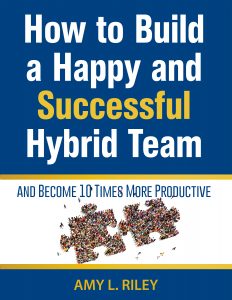
 A Summary of The Courage of a Leader® 4 Pillars
A Summary of The Courage of a Leader® 4 Pillars